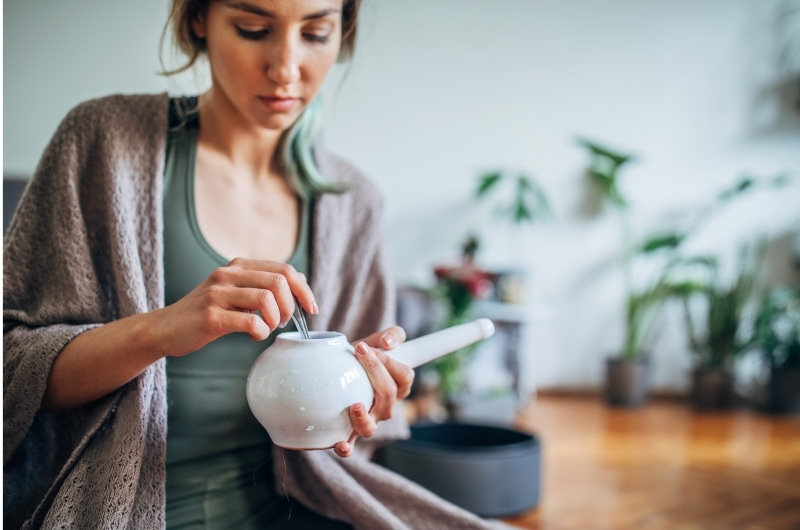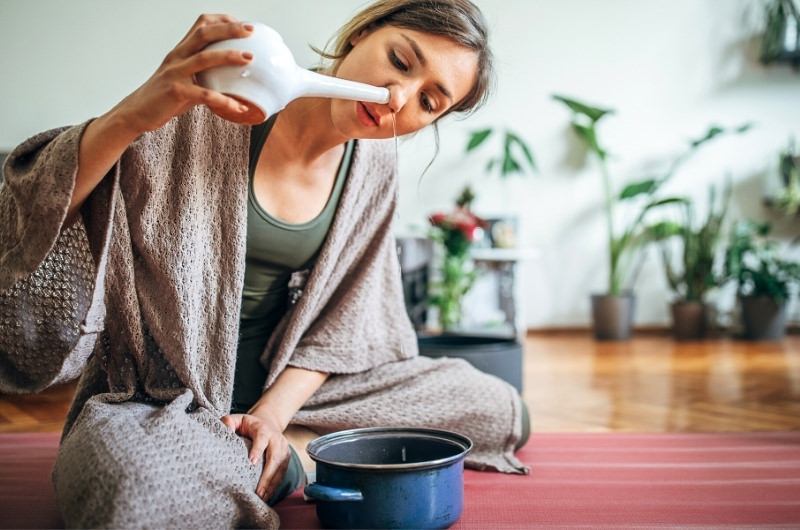The need to blow your nose after Neti pot is like a normal reaction after doing the treatment. If you’re just beginning to use this method of treating your allergies or other nasal problems, know that blowing your nose too hard after using a Neti pot could give you a nosebleed, an ear infection, and even breathing difficulties. Thus, to prevent these, make sure to follow the instructions when using the device.
If you suffer from a runny or clogged nose and nasal drips due to colds, seasonal allergies, and sinus infections, you must find the miracle in a Neti pot.
Not only does it gives you relief from clogged nasal passages, but it may help you avoid taking more antibiotics and prevent developing acute or chronic sinusitis. It also maintains moisture in your nasal membrane, which is important to your sinuses in draining fluids.
However, there is an effective way of using a Neti pot to avoid any problems and ensure you get the relief you need.
How to effectively use a neti pot?

Neti pot is just one of the few devices used for nasal irrigation.
It works by flushing saltwater solution (saline water) into your nasal cavities to clear them from allergens, mucus, and other irritants giving you relief from a runny or clogged nose.
1. Use a sterile saline water
Using sterile water such as distilled, filtered, or bottled water as the solvent for the salt should keep you from getting any bacterial infection.
Avoid using tap water as this may contain harmful parasites which, can damage your nasal passages and even cause brain infection. Instead, you may boil the tap water to kill the bacteria and let it cool before mixing the salt.
Make sure to use water at room temperature (not cold nor hot). Additionally, use only pure salt such as Kosher salt, or you may purchase a pre-mixed saline solution at the pharmacy.
2. Finding the right angle in draining the liquid
Neti pots look like flattened little teapots which, have a snout where the solution comes out.
Finding the right angle when flushing your nasal passages can prevent the solution from getting into your throat.
- Stand over a sink with your head slightly tilted to one side.
- Don’t tilt your head too much to avoid the fluid from getting into your ears.
- Gently move your head forward while keeping your chin tucked in. The goal here is to gently pour the liquid into your nostril and let it flow out to your other nose.
- Breathe only using your mouth and repeat it to the other side.
After you’ve done this, make sure you let the excess fluid drip out from your nose before gently blowing it on a clean tissue.
3. Use it regularly
Using the neti pot twice a day especially, if you’re having a bad runny nose or nasal drippings during the winter, will surely give you instant relief.
If you feel the need to do it more often, it’s probably not a bad idea. However, limit yourself to 3 times a day or ask advice from your doctor.
You might want to consider trying steam inhalation (do it with your face over a steaming bowl of water while draping a towel over your head) to loosen a completely clogged nose before using the neti pot.
If your nose is completely congested, it might be hard for the saline solution to flush away any mucus or debris.
If you just had sinus surgery or got your nose fixed (rhinoplasty), make sure to consult your doctor before using a Neti pot.
Moreover, if you have a facial wound or neurologic and musculoskeletal problems, avoid using a saline flush because you’re at risk of inhaling or breathing in the liquid.
Risks of blowing nose too hard after Neti pots
1. Nosebleeds
Blowing your nose too hard may irritate and rupture the small blood vessels in your nasal passages, resulting in a nosebleed.
However, this usually happens when you do it too hard and too often. So, you should remember to blow your nose gently after using a Neti pot especially, if you rinse your nose several times daily.
Fortunately, nosebleeds are usually not something serious and would stop on their own.
You may treat yourself by following the methods below:
- Sit up straight while leaning your head a little bit forward.
- Pinch your nostrils using your thumb and index finger. Hold it for 5-10 minutes while breathing only through your mouth.
- Avoid blowing or picking your nose for 24 hours after the bleeding has stopped. If bleeding starts again, gently blow your nose to get rid of blood clots.
2. Ear infection and congestion
Another risk of blowing your nose too hard may result in an ear infection.
Your nose links to your ear through a canal called the eustachian tube. Blowing your nose too hard may also cause an abrupt change in pressure on your ears, leading to an earache as a result of ear congestion or a ruptured eardrum.
Ear infections usually resolve on their own. You may manage the pain and other symptoms by using over-the-counter ear drops or pain relievers.
Moreover, you may get rid of the feeling of having clogged ears by blowing your nose gently in a clean tissue. Try to blow from one nostril while keeping the other shut partially but stop if it doesn’t work after a few tries.
If symptoms persist and you experience loss of hearing associated with pain and weird sounds in your ears, please consult an ENT specialist immediately.
3. Dizziness
Blowing your nose too hard may also bring too much pressure in your nasal passages, pushing back excess mucus into your sinuses and would cause difficulty in breathing.
If you don’t supply enough oxygen to your body, you may experience dizziness and vertigo.
You may try to loosen the mucus first to alleviate your breathing difficulties by drinking warm water, steam inhalation, or inhaling eucalyptus oil.
Conclusion
Using a Neti pot is generally safe. Most people can testify to its effectiveness in alleviating problems in their nasal passages or sinuses.
It works by rinsing your nose with a saltwater solution (saline water) and getting rid of allergens, mucus, and other pollutants from your nose.
Doctors often recommend patients with sinusitis, allergic rhinitis, and seasonal allergies do nasal irrigation to relieve symptoms associated with these problems.
Always follow the correct methods of using Neti pots or other devices for nasal irrigation to avoid any problems. Remember that it takes time for you to get used to this naturopathic way of treatment.
Most importantly, refrain from blowing your nose too hard after using the neti pot to avoid the risk of getting a nosebleed, ear infections, and/or dizziness.


